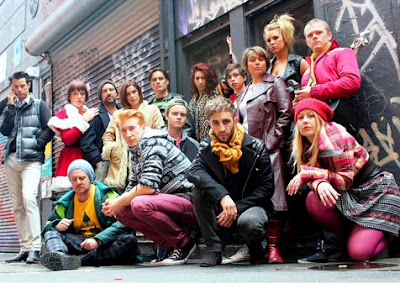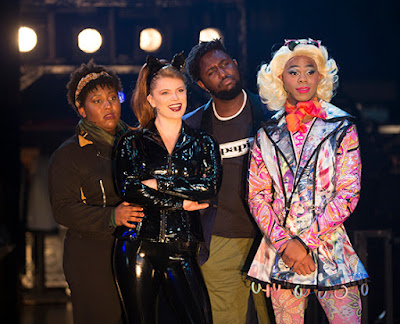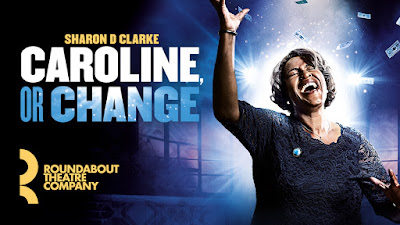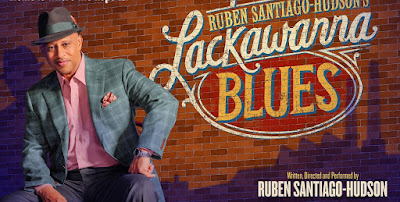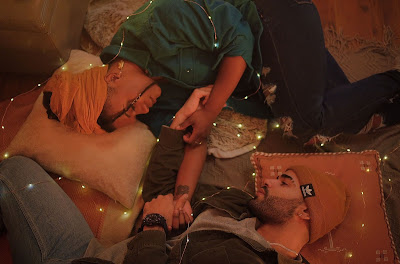Then and now, the lyrics for Jonathan Larson's iconic 1996 musical "Rent" are unmistakably catchy, inspiring and timely. And well, they should be. Like all great music, they have acquired a history, a rhythm, a pulse and a universal vitality that goes way beyond the Bohemian stratosphere from whence they came.
Five hundred twenty-five
Moments so dear
Five hundred twenty-five thousand
Six hundred minutes
How do you measure - measure a year?
In daylights - in sunsets
In midnight's - in cups of coffee
In inches - in miles
In laughter - in strife
"Rent" was....
"Rent" is...
This, of course, came as no surprise to anyone in the cast, in the audience, in the producer's chair, backstage or on the creative team.
"Rent" was definitely in a class of its own.
This is "Rent" the way it was meant to staged and performed in all its gritty, ironic, sexy and heartfelt glory.
It's urgent.
It's raw.
It's romantic.
It pops.
It snaps.
It entices.
It delivers.
Each performance also brings out hundreds and hundreds of RENT-heads (fans of the musical who follow the show from city to city) who come through the theater's doors ready to clap, get emotional, lose control or go absolutely crazy whenever their favorite moment - song, scene or line of dialogue - comes. It's a explosion of sorts and one that undoubtedly heightens the experience that is live theatre.
Feverish.
Poignant.
Humorous.
Savvy.
Resilient.
Solidified.
Then and now, it deals openly and creatively with truthful, personal stories about addiction, eviction, materialism, struggle, legacy, sexual identity, transgender activism, death, poverty, individualism, urban redevelopment and AIDS. Its raw adult language ( "fucking weird," "fucking bitch," "dildo," "clit club," for example) hits hard and home without any form of hesitation or censorship. The characters are full-on and reflective of their impoverished East Village milieu. And nothing is taken for granted or thrown in to knock the audience off- center or on its ass.
The vast Bushnell space, which houses nearly 3,707 people, is big, grand and splendid. Here, "Rent" is larger-than-life as its thrusts itself forward in a 3-D cinematic style not found in smaller theaters where the two-act musical has played before. It's a plus of high proportions that allows "Rent" to swirl, tilt and pivot in glorious Technicolor. It's still the same story (none of the intimacy is lost), but the lights, the sound, the scene changes and the songs are so beautifully configured against the backdrop of this spectacular venue, there are times when you wish you could hit "rewind" and play certain parts of this "Farewell Tour" over and over again.
Instead, he puts his own thrilling, definitive stamp on the "Farewell Tour," a directorial move that heightens and enlightens the original material and gives it a uniqueness all its own. Given the fact that "Rent" was originally conceived back in 1996 - changes - no matter how big or how small, bring additional color and pulse to this particular staging. As director, he tweaks some of the original stage direction (Maureen's choice to partially drop her jeans to bare her bottom is much more ballsy; Mark's use of props or the grabbing of his crotch to simulate an erection is fueled by some pretty playful pornographic comic strokes; Angel's drag queen flamboyance is kicked up a notch). Elsewhere, he thrusts the action forward at a much brisker pace. He brings some of the upstage action downstage, a directorial change that makes certain actor-audience moments more effective. He also brings an enlivened twist and perk to the show's many tune ups, voice mails and holiday greetings, which every RENT-head in the audience can recite verbatim.
Respectful of the play's origins, he lovingly recreates most of the original staging prevalent in the musical's wildly pulsating opening number of "Rent," which sets the stage for the events that follow. The hilarious "Over the Moon," based on the 18th century nursery rhyme "Hey Diddle Diddle," is ignited by some pretty well-timed over-the-top kitsch that thrusts it high flying high and onward. The wickedly feverish "La Vie Boheme," which closes Act I, also unfolds with an enlivened merriment that makes it even more fun to watch.
Larson's recurring themes - living on the edge, taking chances, tragic losses, fighting for survival, a strong sense of community, death and adversity, shielding loved ones from danger, unspoken truths - are emotionally addressed and melodically revisited by "25th Anniversary Farewell Tour" music supervisor Matthew DeMaria whose fierce, quick-shot handling of the material unfolds with the dizzying frenzy and magic of a great artwork set in motion.
Once the show makes its presence known through the catchy, pulsating beat of the opening title song "Rent" - a cry for help channeling the frustrations of twenty-somethings faced with financial hardships - DeMaria follows every twist and turn of the story (the musical takes its cue from Puccini's "La Boheme") with the right sort of involvement and navigational detail intended by Larson.
He lets his players rip through moments of spontaneity, argument and escape, prompting an orchestral fluidity and flourish, mixed with a bustle or two of nostalgia that is hauntingly conceived and played with great warmth, passion and excitement. His conceit not only pays homage to "Rent's" roots, but gives it an immediacy and realization that keeps it both centered and productive throughout.
When necessary, they also squeeze a little bit of extra pulp out of certain phrases and lyrics to make them more palpable for today's audience. This process - a creative choice for this particular revival - brings additional color, depth and confidence to several songs - "One Song Glory," "Rent," "Seasons of Love," La Vie Boheme" to name a few - which, despite familiarity, makes them sound fresh, spunky and surprisingly new.
From start to finish, Marks creates a real, raw and energetic characterization that steers clear of all things Rapp. He nails all of the familiar character traits that Larson set forth for Mark. He brings his own sense of thrill, compassion and playfulness to the part. He takes chances and runs with them. He also exudes a certain charm and sexiness that spills out into the audience every time he's on stage. Vocally, he imbues Mark's many songs with a naturally-placed musicality that is lively, direct and immediate. As both singer and actor, he so loves being on stage in front of a live audience, you can see the excitement on his face whenever he's thrust into the spotlight. His knowledge and understanding of the "Rent" material adds to his feel-good portrayal of the East Village filmmaker. It's a triumphant example of how an actor could create a character, sing a song, tell a story and interact with all the other players in a way that no other art form can.
The musical score by the late Jonathan Larson is smooth, ragged, raw and emotional. It gets the juices flowing. It seduces and invigorates. It gets you thinking.
First time, second time, 100th time, "Rent" still electrifies. What fun! What joy! What a resurrection! Bohemia, thank the Lord, is not dead. It's alive and well in Hartford at the Bushnell.


